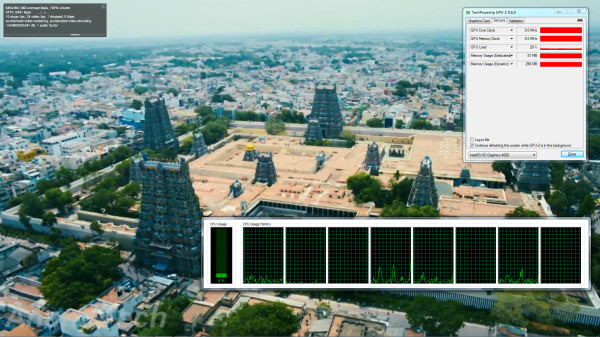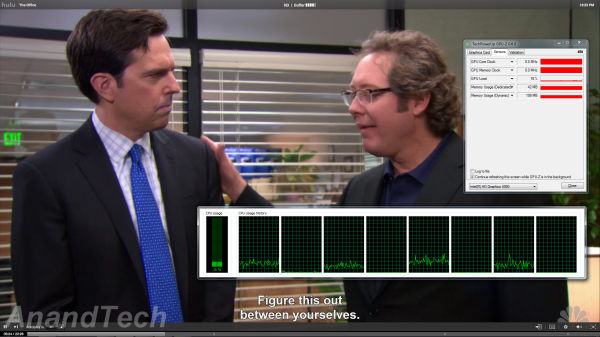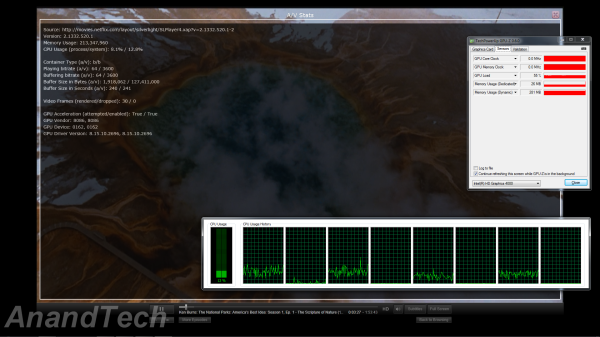Intel's Ivy Bridge: An HTPC Perspective
by Ganesh T S on April 23, 2012 12:01 PM EST- Posted in
- Home Theater
- Intel
- HTPC
- Ivy Bridge
The last time we looked at Flash acceleration in the Intel drivers, we came away disappointed. Have things changed this time around? Intel seems to have taken extra care about this aspect and even supplied us with Flash player builds confirmed and tested to have full GPU acceleration and rendering capabilities. We took the Flash plugin for a test drive using our standard YouTube clip. This time around, we also added a 720p Hulu Plus clip. In the case of YouTube, there is visual confirmation of accelerated decoding and rendering. For Hulu Plus, we need to infer it from the GPU usage in GPU-Z. Hulu Plus streaming seems to be slightly more demanding on the CPU compared to YouTube.
Netflix streaming, on the other hand, uses Microsoft's Silverlight technology. Unlike Flash, hardware acceleration for the video decode process is not controlled by the user. It is upto the server side code to attempt GPU acceleration. Thankfully, Netflix does try to take advantage of the GPU's capabilities.
This is evident from the A/V stats recorded while streaming a Netflix HD video at the maximum possible bitrate of 3.7 Mbps. The high GPU usage in GPU-Z also points to hardware acceleration being utilized.













70 Comments
View All Comments
ganeshts - Tuesday, April 24, 2012 - link
The FSE mode performed visibly worse for me compared to FSW in the few cases that I tried. I have got the rest of the settings that Andrew @ MR used. I may try it and see if it improves things. My aim was to get madVR to render without any dropped frames, and I was able to get that at DDR3-1600 (which is what Andrew used too) for almost all the clips I had (except 720p60, which I didn't try till yesterday).satish0072001 - Tuesday, April 24, 2012 - link
Video decoding and rendering benchmarksCan you provide the learning guide how you've got those scores? It will be very helpful for some of us... I know about hqv score.. but this one is new to me.. kindly help :)
From where can I get these benchmarks if i have to compare my existing system with the IVB results?
LuckyKnight - Tuesday, April 24, 2012 - link
In the article there is a promise of a BIOS update to fix the 23.97Hz issue. Wasn't something similar also promised for sandy bridge in the same article over a year ago!! That never happened did it. I want to build a HTPC already!ganeshts - Tuesday, April 24, 2012 - link
Well, something did happen with SNB.. they got it to 23.972 Hz :) If you think about it, video cards with AMD and NVIDIA GPUs also end up in the 23.974 - 23.978 range, and only very rarely do I actually see a GPU outputting exactly 23.976023976 Hz.If Intel gets between 23.974 - 23.978 in a stable manner, I will consider the matter closed.
Shaggie - Thursday, April 26, 2012 - link
Is there still the problem like with SB that the driver puts color space to limited range when connecting to the tv with HDMI and resets it with every refresh rate switch/reboot with the integrated graphics?Stabgotham - Monday, April 30, 2012 - link
Is there a point to getting an H77 board with Ivy Bridge if all you are using it for is as an HTPC (sans overclock)? I can't tell what the benefit would be to justify the price increase.crisliv - Wednesday, June 13, 2012 - link
Nice article! As always.About the note:
"The good news is that Intel is claiming that this issue is fully resolved in the latest production BIOS on their motherboard. This means that BIOS updates to the current boards from other manufacturers should also get the fix. Hopefully, we should be able to independently test and confirm this soon."
What does it mean exactly? Does it mean that this BIOS update should get refresh rate closer to the 23.976 than it was in your test? And "on their motherboard" - does it mean that this BIOS update is for Intel MB only?
True that in AMD and nVidia the out of the box refresh rate for 23 is never precisely 23.976, but the custom timings on nVidia allows you to get closer to is. There is no custom timing settings on the HD4000, right?
LuckyKnight - Thursday, June 14, 2012 - link
Do we have an update regarding 23.967hz?theboyknowsclass - Tuesday, July 24, 2012 - link
it's been a while, and couldn't find any follow upHdale85 - Thursday, August 23, 2012 - link
I've been looking at an Ivy Bridge setup with the H77/Z77 chipset but I can't find any information about the audio support? Can it bitstream TrueHD and DTS-HD tracks? The older chipsets do it so I would find it strange that the new ones don't, but I don't see it mentioned on any of the new boards or in the intel information.